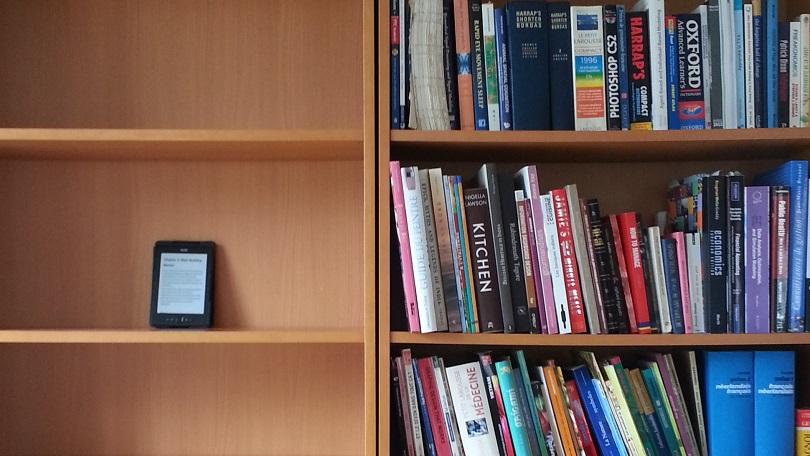I do not care — I do not believe it matters — whether these books are paper or digital, whether you are reading on a scroll or scrolling on a screen. The content is the important thing”. –Neil Gaiman.
In the past few months, they have been jubilations as reports from several quarters have indicated a decline in the sales of electronic books, what this is supposed to imply is that more people are now reading paperback or hardcover books than ebooks. But is the sale of prints really the benchmark for measuring the rates at which eBooks are read? Understandably most people prefer the olfactory and tactile feel of the physical book to the pixilated world of eBooks but this has more to do with conditioning, orientation and the hunger for the material to be read.
Evolving from stones, tree barks, clay, metal sheets, papyrus etc, hard copy books have been with us for ages but the eBook is a new phenomenon. The first e-book in the world was produced only in 1971 by Michael S. Hart; the same year in which the first e-mail was sent by Ray Tomlinson. The e-book as it is, is still in its infancy and technological advances will make sure it keeps the hard copy on its toes. The future as Thomas Edison predicted over a century ago is indeed with the e-book because people are becoming more tech savvy.
See Also: What You Don’t Know About Digital Fingerprints: How Not to Leave Them
We cannot talk about the influence of ebooks and not talk about the influence of public domain books. A public domain book is a book that was either never copyrighted or one whose copyrights have expired or was forfeited. Some books can be subjected to copyrights in one country but be in public domain in another. All around the world books are constantly losing their licenses or copyrights to become public domain property; people who gloat at the recent fall in the sales of e-books are not paying attention to the availability of eBooks in public domain or the efforts that are being made to convert books in public domain into electronic forms; books which are in for “unlimited redistribution and infinite availability”.

There are many sites which have it as their aim to use volunteers to create and distribute e-books for public consumption, sites such as Internet archive now have it as their goal to make available at least 4 million e-books by 2020, Library Genesis already boasts of over 32 million e-books and Project Gutenberg, a pioneer in book digitization boasts of over 50, 000 e-books and an average of over 2 million monthly e-book downloads; add that to the number of the various institutions of learning across the globe with portals for downloads of e-books and you will see that the sales of e-books are not the correct yardstick to gauge the growth of electronic books.
The fact that people are not buying e-books from major online outlets does not mean they are not getting them from other sources; some of those outlets are even often not exempt from hackers with a hunger for some e-titles. Speaking of hunger, people often result to the reading of e-books for economic reasons, there are people with constant power supply, access to the internet, laptops or PCs who live below two dollars a day; will this demographic if passionate about learning not result to the reading of ebooks to overcome whatever cognitive dissonance that might want to stand in their way of self improvement?

The matter at hand is more about conditioning than about the medium of materials; we have been conditioned over the years to have the tactile and olfactory feel of whatever we are reading and as old habits die hard, we might need to recondition ourselves to enjoy this new vista of the e-book that has been opened before us. Apart from the e-book being of great importance to the print disabled and dyslexic persons, in addition to the fact that there are books that are only available in electronic forms, there are great advantages the average e-book reader can enjoy especially if he or she is connected to the internet while reading.
For instance, you can look up a word that’s new to you, copy and paste its meaning as a comment on that word in the e-book and it will be there when you eventually want to read the book again. How about the ease with which we can copy highlighted parts of ebooks; with the e-book, it is a matter of copy and paste but with prints, you have to manually copy everything into a scrapbook and sometimes you don’t because of the volume of the highlighted passages. In fact, one can actually make more notes or observations on an e-book than on a hard copy book.
See, I am a lover of books, so I often mourn the demise of books that leave my shelf and never make their return; it irks me to think of them as the dead who have gone to the hands or lands of no return. But with the e-books things are different; you can share them with friends and never worry about their return and sometimes the pages you have highlighted and the marginalia in them will make it easier for them to read.

To be adventurous is the first thing the reading of books teaches us, to leave our comfort zones and explore other shores either outside or within our own minds; every true learner knows that in addition to improving our working memory, new skills increase our vocabulary, communication skills, and confidence.
Future of EBooks
Those who whine about eBooks just need to unplug themselves from the matrix of their conditioning, they have plenty to gain when they add the ability of reading eBooks to their arsenal: they have economy of space, time, money and flexibility of use, they, in other words, become amphiliterate; having the ability to read both prints and e-materials comfortably. The future is with the e-book and other digital means of assimilation of information, one should therefore not be among the illiterates of the digital age whom the psychologist Herbert Gerjuoy referred to as not those who “cannot read and write, but those who cannot learn, unlearn, and relearn”.














